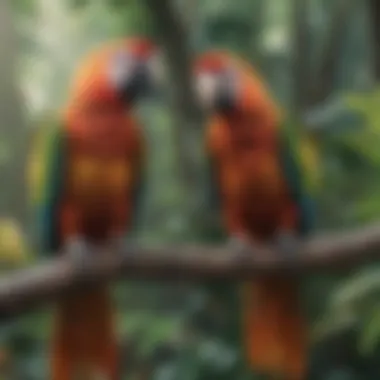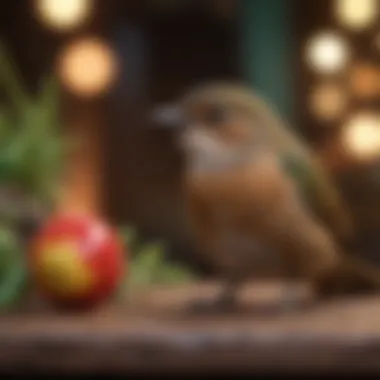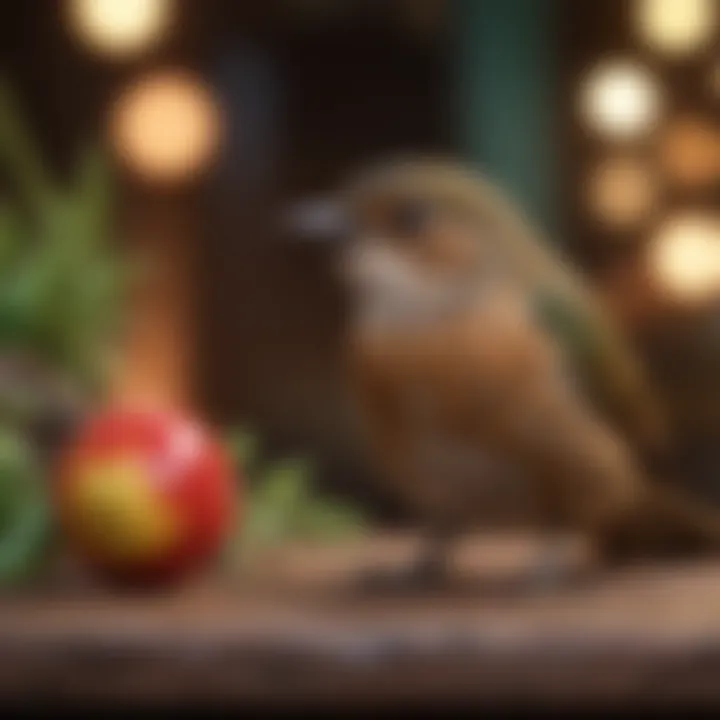Caring for Avian and Exotic Pets: A Comprehensive Guide


Intro
Pet ownership can be one of the most rewarding experiences in life, but caring for avian and exotic pets adds another layer of complexity. These creatures, from vibrant parrots to unique reptiles, bring their own set of distinct needs and quirks that any owner must be attuned to. Understanding what it takes to create a harmonious bond with these incredible animals is essential, affecting not just their health, but also their happiness.
As we embark on this journey to explore both the art and science of caring for such pets, we will delve into nutrition, habitat, emotional connection, and so much more. Whether you’re a seasoned pet owner or just dipping your toes into the world of avian companionship, this comprehensive guide aims to enlighten and inform.
Before we dive head-first into these elements of care, let’s break down what you should expect in the following sections. We’ll start with the foundational aspects of avian care, touch on techniques for meaningful interaction with your feathered friends, discuss their emotional well-being, and conclude with insights into their overall health and safety. By the end of this guide, we hope to expand your understanding and appreciation of these remarkable creatures.
Avian Care Basics
Caring for birds goes beyond feeding them seeds or keeping their cages clean. It involves understanding their nutritional needs, creating an enriching environment, and providing regular grooming and hygiene. Here’s a closer look at the basics:
Importance of Proper Nutrition
A bird's diet is the backbone of its health. Poor nutrition can lead to a host of issues, such as feather plucking, lethargy, and even serious diseases. Each species has its own dietary requirements, which can range from seeds and pellets to fresh fruits and vegetables.
- Seeds: While tasty, they should not be the sole part of a bird's diet. Specific seed mixes may cater to certain bird types, but they should largely be combined with pellets and fresher foods.
- Pellets: High-quality pellets can provide essential nutrients that seeds often lack.
- Fruits and Veggies: Fresh produce brings variety and additional vitamins. Dark leafy greens are generally a hit among many bird types.
It’s crucial to research the unique nutritional needs of your specific bird species to ensure a well-rounded diet.
Understanding Bird Species and Their Needs
Different birds come with different temperaments, requirements, and care strategies. For example, a cockatoo thrives on social interaction and could quickly develop behavioral issues if neglected, whereas a finch, while social, may prefer more independence.
- Small birds (like finches and canaries) typically require less space and are easier to maintain.
- Medium to large birds (like cockatoos and macaws) demand more attention and longer playtime, making them quite the commitment.
Understanding these aspects helps in choosing the right species based on the owner’s lifestyle.
Basics of Birds Habitat Setup
Creating a suitable habitat is vital for your bird's happiness and health. Factors to consider include:
- Cage Size: Ensure the bird can stretch its wings without hitting the sides.
- Perches: Varying sizes and materials will keep feet healthy and prevent boredom.
- Toys: Rotate toys to stimulate mental agility and enrich the environment.
Always ensure that their habitat mimics natural conditions as much as possible to keep them fulfilled.
Grooming and Hygiene Tips
Keeping your bird clean not only has aesthetic value but also impacts its health. Regular grooming practices include:
- Wing and Beak Care: Birds may need wing clipping, though this should be done professionally or under guidance. Their beaks should be checked for overgrowth.
- Bathing: Some birds enjoy misting or shallow baths to keep their feathers in top shape.
- Cage Cleaning: A clean cage prevents disease. Aim for daily spot cleaning and a deep clean weekly.
By establishing a routine that focuses on these care aspects, pet bird owners set the foundation for a well-rounded companionship that’s both satisfying and sustainable.
Prelude to Avian and Exotic Pets
Exploring the realm of avian and exotic pets unveils a rich tapestry of companionship and care that is often overlooked in traditional pet ownership discussions. These unique animals, ranging from colorful parrots to delicate finches, not only bring joy into homes but also demand significant commitment and understanding.
In this section, we will draw attention to critical elements that underscore the importance of avian and exotic pets in today's society. As people become more attuned to the idea that companionship can come from unconventional sources, birds and other exotic creatures are increasingly sought after. Their vibrant personalities and varying behaviors can often enrich human lives in ways that typical pets may not.
Defining Avian and Exotic Pets
So what exactly are avian and exotic pets? The term "avian" typically refers to birds kept as pets, encompassing a wide array of species like cockatoos, canaries, and parakeets. Exotic pets, on the other hand, extend further into the animal kingdom, detailing creatures such as reptiles, amphibians, and small mammals like ferrets or sugar gliders.
Many people have a narrow view of pets, often associating them with familiar cats and dogs. However, keeping avian and exotic pets can introduce one to a diverse range of companionship and engagement. Each species comes with its own set of characteristics, needs, and care requirements, painting a fuller picture of what it means to be a pet owner.
Importance of Companionship in Pet Ownership
The significance of companionship, particularly in the context of avian and exotic pets, cannot be overstated. Owning these types of pets fosters emotional connections that are both rewarding and unique. Such relationships allow individuals to cultivate empathy, spend quality time, and even engage in play that sharpens their mental fitness.
- Richer Experiences: The presence of these animals can create a unique bond, offering joy in watching behaviors that are often endearing and sometimes quite amusing.
- Stress Relief: Studies have shown that interacting with pets, including birds and exotic animals, can significantly lower stress levels. Simply having them around may help soothe the mind and lighten the mood.
For pet bird owners or those considering this journey, recognizing the aspects of attachment is a fundamental part of the experience. Avian companions often demonstrate a remarkable capacity for social interaction, and their need for companionship often mirrors that of humans. Loving connections can turn into vital relationships that add depth to both the pet's and owner's lives.
"The bond between humans and their avian companions offers profound rewards, transforming simple interactions into lasting friendships that defy expectations." - Avian Care Specialist
As we move through this article, we will explore various topics that further highlight the richness of nurturing and caring for avian and exotic pets. Understanding their specific needs, behaviors, and dietary requirements will ultimately paint a clearer picture of the care and companionship involved.
Choosing the Right Avian Companion
Choosing the right avian companion is a critical step in ensuring a fulfilling relationship between bird and owner. Setting the right tone from the outset can all but guarantee a harmonious lifestyle, fostering a bond that enriches both parties. Birds are not just pets; they are social creatures with distinct personalities and needs. A good match between the pet and the owner can make all the difference, turning a simple pet ownership experience into a deeply rewarding relationship.


Assessing Lifestyle Compatibility
When considering avian companionship, it’s vital to assess lifestyle compatibility. Not all birds are created equal, nor do they fit every household dynamic. Here are a few factors to consider:
- Time Commitment: Birds require attention. Some species thrive on social interaction and need hours of engagement each day, while others are more independent. If you’re away from home often, a more self-sufficient bird might be a better choice.
- Noise Levels: Many birds are vocal and can be quite loud. For instance, a Macaw can easily reach decibel levels comparable to a chainsaw! Assess how your living arrangement accommodates sound. You don’t want your feathered friend to cause a ruckus all day long, driving you or your neighbors up the wall.
- Space Requirements: Size matters. Larger birds need more space to stretch their wings and explore. The larger the cage, the better - as a general rule of thumb, it should be at least equivalent to the bird’s wingspan plus a good margin of comfort. Ensure your home can provide a suitable habitat that allows for movement and activity.
Taking these elements into account can help you make an informed decision regarding which bird fits seamlessly into your life.
Popular Species for Home Environments
Once you’ve thought through your lifestyle, the next step is to explore which types of avian companions are best for home environments. Here’s a look at some popular species:
- Budgerigar (Budgie): These small parakeets are known for their playful nature and vocal abilities. Budgies can adapt to many living conditions, making them ideal for beginners. They bond well with owners and can learn to mimic speech.
- Cockatiel: Similar to Budgies but typically larger, Cockatiels are friendly and affectionate. They're also easier to train and often enjoy being handled. They display a unique and entertaining behavior that can charm anyone.
- African Grey Parrot: Highly intelligent and known for their exceptional talking abilities, African Greys require a more committed owner. They are social birds that thrive on interaction and can develop strong bonds with their caregivers if given the right attention and mental stimulation.
- Lovebirds: As the name suggests, these birds can develop strong emotional connections with their owners or a mate. They require more social interaction compared to other small birds and are perfect for those willing to spend time engaging with them daily.
Understanding the characteristics and needs of these species can help potential pet owners choose wisely. Each bird has its signature traits, and knowing them can pave the path to a cherished companionship.
In essence, choosing the right avian companion can lead to years of joy and connection, fostering not just a pet relationship but a lasting bond.
Understanding Avian Behavior
Understanding avian behavior is a cornerstone for anyone considering bird ownership. Birds are intelligent creatures and their actions can speak volumes about their emotional states and needs. Grasping how birds behave can lead to a more satisfying relationship between you and your feathered companion. When you dive into the intricacies of avian behavior, you not only enhance the well-being of your pet, but also enrich your own experience as a bird owner.
Social Dynamics of Birds
Each bird species has its own social quirks and traits. Some are gregarious and thrive in a bustling environment, while others prefer solitude or the company of just a few familiar mates. For instance, parakeets, often seen as some of the friendliest birds, display strong social bonds not just with each other, but also with their human caregivers. They often benefit from the interaction as it mirrors their natural instincts to flock.
Conversely, some species such as the cockatoo are more individualistic. They form deep attachments to their owners and may experience separation anxiety if left alone too often. This diversity in social dynamics also means that a bird's behavior can shift based on their living environment and social interactions. For anyone looking to adopt a bird, understanding these distinctions is vital. Choosing a bird that matches your lifestyle will reduce behavior issues down the line.
"Birds live by their social structure. Understanding this helps you create an environment that caters to their needs." - Avian Behavior Specialist
Recognizing Body Language in Birds
Birds communicate largely through body language. Unlike dogs or cats, they don’t rely on vocalizations alone. Observing your bird's posture, wing position, and tail movements can provide key insights into how they feel. For example, a bird that's puffing up its feathers may be trying to ward off perceived threats, indicating it feels vulnerable. On the flip side, a bird with its wings slightly spread might simply be stretching or indicating excitement.
Another tell-tale sign is the position of the beak and head. A bird that’s tilting its head or bobbing may be engaging in a playful interaction. Conversely, if a bird hunches up and lowers its head, it may be feeling scared or unsure. Understanding these signals not only aids you in responding appropriately but also strengthens your bond through mutual understanding.
Being attuned to these nuances helps in preventing misunderstandings, reinforcing trust, and maintaining a joyful home for you and your avian companion.
The nuances of avian behavior ultimately paint a comprehensive picture of your pet's personality. With patience and observation, you'll find rich veins of companionship waiting just beneath the surface.
Essential Nutrition for Pet Birds
Nutrition serves as the bedrock of health for pet birds, a fact that cannot be overemphasized. Proper nourishment not only supports their physical well-being, but also influences their behavior and longevity. Just like any other pet, birds thrive on a balanced diet tailored to their specific needs. Misjudging these requirements can lead to various health issues, making it essential for bird owners to understand the unique dietary demands of their feathered friends.
Understanding Dietary Needs by Species
Different bird species have distinct dietary needs. Some may require more seeds, while others might thrive on fruits and veggies. For instance, while budgerigars, those friendly little parakeets, tend to favor seeds rich in fats and carbohydrates, larger birds like macaws often need a hearty mix of nuts, legumes, and fresh produce.
- Budgerigars: Prefer a seed-based diet, but they benefit greatly from leafy green veggies and occasional fruit.
- Cockatiels: Thrive on a mix of seeds, pellets, and fresh fruits. Oats and corn are crowd favorites!
- African Grey Parrots: Need a more balanced intake that includes nuts, seeds, and high-calorie foods to meet their energy needs.
- Canaries: Best suited to a diet rich in seeds and supplemented with veggies like carrots and spinach.
It’s prudent to also consider the age, weight, and health of the bird when determining their dietary plan. Young birds may have different nutritional requirements than their older counterparts. Thus, regular consultations with avian veterinarians can offer tailored advice, ensuring each bird receives the nutrients crucial to their health.
Common Mistakes in Bird Feeding
Many bird owners unknowingly fall into traps when it comes to feeding their pets. These mistakes can lead to nutritional deficiencies or even obesity. Here are a few blunders to steer clear of:
- Over-reliance on seeds: While seeds may be enjoyable, a diet too rich in them can cause health issues. Seeds tend to be high in fat, and without a variety of other foods, a bird may not get essential vitamins.
- Neglecting fresh foods: Fresh vegetables and fruits are key to a bird’s diet! Without them, birds may miss out on important nutrients which can lead to a poor immune response.
- Ignoring safe foods: Not all foods are safe for birds. Foods like avocados and chocolate can be toxic. It’s crucial to research what’s safe to feed.
- Portion sizes: Birds can be picky eaters, often picking out their favorite foods. This might lead to an unbalanced diet if portion sizes aren’t monitored.
Feeding pet birds isn’t as straightforward as it seems. Each dietary component plays a role in their overall health and happiness. When owners ditch the common pitfalls and invest time in understanding their birds’ needs, they pave the way for decades of joy and companionship together.
"Birds are the only animals that live the way we should live — in harmony with the environment, their home, and their social groups." — John C. McLemore
In essence, a well-researched approach to nutrition can make all the difference in ensuring your feathered friend thrives in your care, signing up for an extended relationship laden with avian chatter and companionship.
Creating a Suitable Habitat
Creating a suitable habitat for avian and exotic pets is not just about aesthetics; it's a fundamental step that determines their well-being and happiness. Birds and other exotic pets thrive best when their environment mimics their natural habitats, providing the necessary elements for physical health and mental stimulation. A well-thought-out habitat lays the foundation for a fulfilling life for these unique companions, ensuring they flourish in a setting that caters to their behavioral, social, and physical needs.
Designing an Enriching Environment
When it comes to designing an enriching environment for avian pets, several key factors must be taken into account. First, consider the space requirements based on the specific species. For instance, large parrots such as macaws require significant room to spread their wings and fly, whereas smaller birds like budgerigars can thrive in more compact spaces. The layout should include vertical space, as many species enjoy climbing and flying up and down rather than just horizontally.
Next, incorporate natural elements. Use perches of varying shapes and sizes, mimicking the natural landscapes of forests or jungles. Natural wood perches are often preferred, as they provide a more comfortable grip compared to the smooth plastic alternatives. Adding toys that stimulate mental challenges, like foraging toys or puzzle feeders, will also keep your bird engaged. Furthermore, ensure that the habitat has appropriate lighting and ventilation. Birds benefit from natural sunlight, which helps in synthesizing Vitamin D, crucial for their overall health.


Importantly, consider social interaction when designing the environment. Avian pets are social creatures that thrive on companionship. If possible, placing their habitat in a high-traffic area of the home will allow them to engage with family members while enjoying each other’s company. A thoughtfully designed habitat doesn't just provide a space to live; it fosters a nurturing environment where your bird can explore, forage, and play.
Cleaning and Maintenance Guidelines
Maintaining a clean habitat is essential for the health of your avian companion. Regular cleaning routines help prevent the build-up of harmful bacteria and parasites that can affect both the pet and the owners. Here are some guidelines to keep in mind:
- Daily Cleaning Tasks: Remove any uneaten food, clean food and water dishes, and spot-clean droppings on perches and the cage bottom.
- Weekly Tasks: Give the entire cage a thorough cleaning. Use bird-safe cleaners to scrub surfaces and replace any soiled bedding or substrate. This task also includes cleaning any toys that are part of the habitat.
- Monthly Maintenance: Every month or so, it’s vital to do a more intensive clean. This should include a deep clean of the cage, changing out the substrate completely, and checking for any wear and tear on toys or equipment.
Keeping a clean habitat not only protects your pet's health but also maintains a pleasant environment for your household.
Remember: The happier and healthier the environment, the happier and healthier your avian companion will be.
Health Care for Exotic Pets
Taking care of exotic pets goes beyond just providing them food and a home; it also involves keeping a close eye on their health. Exotic pets, like birds, can be particularly vulnerable to a variety of ailments due to their unique biological systems. Therefore, understanding their health care is crucial for ensuring their longevity and happiness. When you take the time to monitor their health, you can catch potential issues before they escalate into bigger problems. This section will guide you through recognizing common ailments and establishing preventive care strategies crucial for your pet’s well-being.
Recognizing Common Ailments
Avian health can be a bit of a puzzle for both new and seasoned owners. Birds often hide their illness until they are significantly unwell, making the task of recognizing health problems even more challenging. Here are a few common ailments that you must keep a lookout for:
- Respiratory Issues: If a bird is sneezing or has difficulty breathing, it may indicate an underlying issue such as a respiratory infection or allergies.
- Feather Problems: Excessive feather plucking or changes in feather condition can point to stress or nutritional deficiencies.
- Digestive Disturbances: If you notice changes in droppings, such as unusual colors or textures, that could indicate gastrointestinal problems.
- Behavioral Changes: A sudden shift in behavior, such as increased aggression or lethargy, should never be ignored.
Being vigilant about these signs can help you act promptly. If any of these issues arise, consulting a veterinarian who specializes in avian medicine is essential. As the saying goes, "A stitch in time saves nine."
Preventive Care Strategies
Prevention is often the best medicine, especially for exotic pets. By integrating proactive strategies into your bird care routine, you will not only maintain your bird’s health, but also foster a long-lasting relationship. Here are a few key approaches:
- Regular Veterinary Check-ups: Schedule annual or biannual vet visits to ensure your bird stays in top shape.
- Balanced Diet: A varied diet rich in fruits, vegetables, and specifically formulated pellets can go a long way. Remember, lack of nutrients can lead to all sorts of health issues.
- Environment Management: Maintaining a clean, safe, and enriching habitat is a cornerstone of preventive care. Regular cleaning can help reduce the risk of infections.
- Socialization and Stimulation: Engaging your pet with toys and interaction helps reduce stress and keeps their mind sharp, which is crucial for emotional health.
- Observation: Take time each day to watch your bird’s behavior and condition. You know your pet best, and recognizing subtle changes could save its life.
"An ounce of prevention is worth a pound of cure." By being proactive in your exotic pet’s health care, you invest in their quality of life and enrich your companionship.
In summary, keeping your exotic pet healthy requires both awareness and initiative. Recognizing common ailments is the first step, while preventive care strategies lay the groundwork for a happy, fulfilling relationship between you and your avian companion.
Behavioral Training Techniques
Training your avian companion might not seem like a walk in the park, but it's a vital piece of the puzzle in building a harmonious relationship. This process encompasses more than just teaching tricks; it's about shaping behavior, improving communication, and fostering mutual trust. When you invest time in behavioral training, you're not only helping your bird become well-adjusted but also enhancing your bond. Birds are incredibly social and intelligent creatures that thrive in interactive environments. Effective training can set the stage for a joyful, less stressful home.
Exploring Positive Reinforcement
Positive reinforcement stands out as one of the most effective methods for training avian companions. This technique relies on rewarding desired behaviors rather than punishing undesired ones. The objective here is to create a more inviting atmosphere where your feathered friend feels safe and motivated to learn.
For instance, when your bird performs a trick or behaves in a way you appreciate, rewarding it with a treat or praise can significantly reinforce that action. Such an approach doesn't only make the training more enjoyable for your pet but also makes it more likely for them to repeat those behaviors in the future. Here are some tips for implementing positive reinforcement in your training regimen:
- Timing is key: Offer the reward immediately after the desired behavior to help your bird connect the two.
- Consistency counts: Use the same cues and rewards to create a clear pathway for learning.
- Mix it up: Birds can get bored. Switching up treats or including new tricks keeps training fresh and engaging.
- Patience is a virtue: Give your bird time to understand and master each step.
Incorporating positive reinforcement into your training can transform your interactions, turning lessons into a fun game rather than a chore.
Challenges in Training Exotic Birds
Despite its many benefits, training exotic birds can come with its share of challenges. Every species has its nuances, and understanding these is vital for successful training. Not all birds respond the same way, and some might be more stubborn than others. For instance, a Macaw might catch on quickly, while a finch could take a little longer to grasp commands. Here are some common hurdles you might encounter:
- Short attention spans: Birds are known to have brief bursts of focus. Training sessions may need to be brief but frequent to maintain their interest.
- Fearfulness: Some birds may react defensively to new situations or commands. It's crucial to approach training with gentleness to avoid causing stress.
- Miscommunication: Birds may not always understand what you're trying to convey, especially if cues are inconsistent. Clear communication is pivotal.
- Individual personality: Each bird has its unique temperament. A more independent bird may resist commands, while a playful one might excel at tricks.
Recognizing these challenges and preparing to address them will help you navigate the training process more smoothly. Keep in mind that patience and adaptability play a significant role. Every small step forward is progress in this rewarding journey. The road might be winding, but the end result—a well-behaved and happy feathered friend—is worth every effort.
Fostering Emotional Bonds
Building emotional connections with pet birds is a cornerstone of responsible pet ownership. The bond you cultivate with your feathered friend can significantly influence their well-being, behavior, and overall happiness. When birds perceive their caregivers as companions rather than mere providers of food and shelter, a richer and more engaging relationship develops. This emotional bond not only enhances the quality of life for the bird but also enriches the owner's experience. As any seasoned pet parent would attest, the sense of companionship that comes from an impactful bond is irreplaceable.
Fostering emotional bonds involves understanding and responding to a bird’s unique emotional needs. Birds are not instinctually daft or simple creatures; they possess a distinct range of emotions, from joy and excitement to fear and jealousy. Therefore, recognizing their emotional states aids in creating a nurturing environment where they feel safe and cherished. This headway into emotional understanding can often open avenues for training and communication, helping the owner respond effectively to their pet’s needs, thereby minimizing behavioral issues.
"Giving a bird a loving environment makes them feel at home, which reflects in their demeanor."
Understanding Attachment Styles in Birds
Birds have different styles of attachment that can mirror those observed in humans. Some may form tight bonds with one individual, becoming quite dependent, while others may prefer a broader social circle, enjoying relationships with multiple caregivers. Recognizing these attachment styles is essential for developing appropriate socialization strategies.
- Monotropic Attachment: This type fosters a strong bond with one caregiver, leading the bird to become highly devoted and protective of that person. Parrots like the African Grey often exhibit this behavior, forming deep emotional ties.
- Polyadic Attachment: Here, the bird builds connections with multiple individuals. Budgerigars, often raised in flocks, can demonstrate such behavior, appreciating companionship from various sources rather than relying on one person.
- Ambivalent Attachment: Some birds may display mixed feelings toward caregivers, feeling insecure or showing signs of anxiety in their presence. Exotic species such as cockatoos may experience ambivalence due to past traumas or inadequate interactivity, necessitating a sensitive approach in their care.
Understanding these various styles informs the type of interaction you should pursue, aligning your approach with your bird’s specific emotional needs.
Activities to Enhance Bonding


Creating a solid emotional connection is an ongoing endeavor that calls for time, patience, and creativity. Engaging in specific activities can foster closeness and trust, ensuring a fruitful relationship with your avian companion. Here are some practical activities:
- Quality Time: Spend time simply being near your bird. Reading aloud, playing soft music, or narrating your day can help them get accustomed to your voice and presence.
- Interactive Play: Utilize toys designed for interaction, such as puzzles or ringing bells. These encourage your bird's mental stimulation while deepening your connection through cooperative play.
- Training Sessions: Positive reinforcement methods during training build trust. Use treats to reward desired behavior, enhancing the bond through shared success and understanding.
- Socialization: Introducing your bird to new experiences, whether it’s a visit to a different room or a short ride in a carrier, can help them gain confidence and trust in your companionship.
- Routine Handling: Regular, gentle handling teaches your bird to feel safe with you. It’s wise to keep these sessions short and positive, ensuring they don’t become overwhelmed.
Fostering an emotional bond with your pet bird is a journey that pays off in countless ways. Understanding their attachment styles plus engaging in structured activities builds a lifetime of companionship, trust, and happiness.
Challenges Unique to Exotic Pets
Understanding the challenges unique to exotic pets is vital for current and prospective owners. These challenges often encompass legal, ethical, and misinformation-related areas that can significantly impact the well-being of animals, as well as the experience of their caretakers. Ignoring these aspects can lead to misunderstandings and difficulties in pet ownership, jeopardizing not just the animals' lives but also the relationship between birds and their companions.
Legal and Ethical Considerations
Owning exotic birds involves navigating a complex web of legal frameworks that vary from one region to another. It’s not just about filling out paperwork or picking up a pet; there's a strong undercurrent of laws designed to protect both the birds and potential owners. Many states and countries regulate the ownership of certain bird species, usually to ensure that these creatures are not endangered due to trafficking or illegal breeding practices.
For instance, species like the Scarlet Macaw might require special permits due to their conservation status. The legality of owning such birds means potential owners must do their homework before bringing a new feathery friend into their homes. Engaging with organizations like the U.S. Fish and Wildlife Service can provide clarity about legal stipulations depending on your locale.
Moreover, ethical ownership goes hand in hand with legal compliance. Just because you can own a particular bird doesn’t mean you should. Each exotic pet has its own set of needs—psychological, social, and dietary—that must be understood and respected. Remember, adopting a bird is not just a trophy for your living room; it requires a commitment to provide a proper habitat, social interaction, and ongoing healthcare.
"Owning an exotic bird is not just about possession; it's a responsibility that requires an understanding of their unique social and physical needs."
Addressing Misconceptions about Exotic Birds
Misconceptions often cloud the understanding of what it means to care for exotic birds. For example, many people think these creatures can thrive in isolation. In reality, birds are social animals and need interaction—either with their owners or other birds—to live fulfilling lives. This belief often leads to neglect, casting a shadow on the concept of responsible ownership.
Another common myth is that all birds are low-maintenance pets. While some species may require less attention, many need a significant time investment for socializing, training, and exercise. The notion that birds only need food and water is both simplistic and dangerous. A good bird owner must provide enrichment through toys, flying time, and social opportunities.
Also, the idea that exotic birds will be silent companions is a falling misconception. Quite the opposite! Birds like African Greys can be incredibly vocal, contributing to a dynamic and sometimes noisy household. Understanding these quirks can prepare owners for the realities of living with such vibrant creatures.
It’s essential to educate yourself, perhaps through reputable sources like the Cornell Lab of Ornithology or various avian forums like those found on reddit.com. The more informed potential owners are about the true nature of exotic birds, the more they can adapt their lifestyles to accommodate these unique pets properly.
In summary, addressing the legal and ethical considerations, as well as dispelling common myths about exotic birds, forms the backbone of responsible pet ownership. This understanding enhances not just the lives of exotic pets but enriches the experience of their human caregivers as well.
The Joys of Pet Bird Ownership
Having a pet bird can bring a unique charm into one's life that few other pets can replicate. The joys of pet bird ownership go beyond just having a chirpy companion; it includes creating meaningful connections, enjoying their vibrant personalities, and even embracing the responsibilities that come with these fascinating creatures. Birds are often seen as symbols of freedom, but when domesticated, they can provide insights into the beauty of companionship.
One of the essential reasons why pet birds captivate so many individuals is their ability to forge rich, emotionally satisfying relationships with their owners. Studies indicate that pet owners experience lower levels of stress and increased overall happiness. A pet bird can mimic the sounds of laughter or sing along with your favorite tunes, creating a lively atmosphere around the house. The simple act of watching your feathered friend play can brighten even the cloudiest days. Their quirks and antics can bring joy and laughter, turning mundane moments into cherished memories.
Anecdotes from Bird Owners
The stories that bird owners share often highlight the profound connections formed between humans and their avian companions. For instance, one owner recounts her experience with a vibrant parakeet named Kiwi. Every morning, Kiwi would greet her with a cheerful whistle, making mornings feel less like a chore and more like an occasion. Another owner speaks fondly of their cockatoo, who learned to mimic not just words but also phrases that resonated with the owner's character.
"My African Grey, Sam, has a way of knowing when I’m having a rough day. He’ll spontaneously start to chatter or dance to my favorite songs, reminding me to take a step back and lighten up!"
Such relationships illustrate how bird companionship extends emotional understanding, often surpassing mere interaction. Bird owners frequently describe moments of genuine connection that transcend verbal communication.
Bird Personalities that Captivate
Each bird species has its own personality traits that make them special. For instance, budgerigars are known for their social nature and playful antics. They thrive on interaction, often engaging in games that involve exploring new toys or mimicking their owners. Meanwhile, cockatoos have a reputation for being affectionate yet demanding, often desiring constant attention from their caregivers.
Here are a few captivating bird personalities:
- Parakeets: Friendly, social, and often quite chatty, they are ideal for first-time bird owners.
- Lovebirds: Known for their affectionate nature, these small birds often form strong bonds with their owners and each other, showing their love through cuddling and shared play.
- African Greys: Renowned for their intelligence and ability to communicate, these birds form deep companionships and enjoy stimulating activities.
- Canaries: While a bit more reserved, their sweet songs can fill a home with melody, offering a tranquil presence.
Forming a bond with your pet bird can be incredibly rewarding. Each type of bird showcases different aspects of personality, ensuring that there’s a perfect companion for everyone. The small joys of bird ownership add layers of happiness to daily life, fostering a companionship that’s hard to replicate elsewhere.
Ending and Future Insights
As we wind down this exploration of avian and exotic pets, it’s clear that these beautiful creatures offer not just companionship but a world of learning and engagement. This topic matters deeply in understanding how to provide the right environment and care necessary for these animals to thrive and for owners to find joy in their presence. It positions pet ownership not merely as a hobby but as a genuine relationship that requires commitment and knowledge.
The Evolving Landscape of Pet Ownership
The landscape of pet ownership has drastically shifted over the years. Gone are the days when a simple bowl of water and a bag of kibble sufficed. Nowadays, owners are more informed, seeking a richer experience with their pets. As people dive into the world of avian and exotic pets, they uncover vast resources and an abundance of information. This constant evolution often results in families considering birds as true members of the household. Just like dog or cat owners, bird enthusiasts share their stories, challenges, and triumphs in nurturing their feathered friends.
Some key elements of this evolving landscape include:
- Social Media Influence: Platforms like Facebook and Reddit have created communities that share tips, memes, and heartwarming stories about birds. These platforms serve as catalysts for knowledge sharing among owners and breeders.
- Sustainability Considerations: More pet owners are thinking about ethical practices in pet ownership. The push towards adopting exotic pets responsibly ensures that we keep conservation in mind.
- Advancements in Care: Pet supply companies are continuously developing specialized products aimed at improving pet health, from fortified diets to engaging toys. Owners have more choices now than ever before to keep their companions happy and healthy.
The dynamics of ownership reflect a wholesome change in attitude—a shift toward seeing pets not just as animals but as companions who share in our lives and experiences. Considering all this, engaging in careful research and community involvement is essential.
Resources for Continued Learning
For pet bird ownership to be rewarding and successful, staying informed is crucial. A wealth of resources is available to keep pet owners and enthusiasts up to date. Here are some recommendations:
- Books: Titles like "The New Bird Owner's Guide" offer in-depth insights into avian care, from basic needs to advanced training techniques.
- Websites: Websites such as en.wikipedia.org and britannica.com have articles dedicated to bird species, health tips, and legal considerations concerning exotic pets.
- Community Forums: Platforms like reddit.com facilitate discussion among pet owners, where one can share advice or seek guidance on caring for specific bird species.
- Workshops and Webinars: Attending workshops organized by local animal rescues or wildlife organizations can provide hands-on learning and updates on best practices.
Engaging with a range of resources helps ensure that owners are making informed choices for their feathered companions.
In the world of avian companionship, it’s the shared understanding and ongoing education that enriches both the pet’s life and the owner’s experience.















